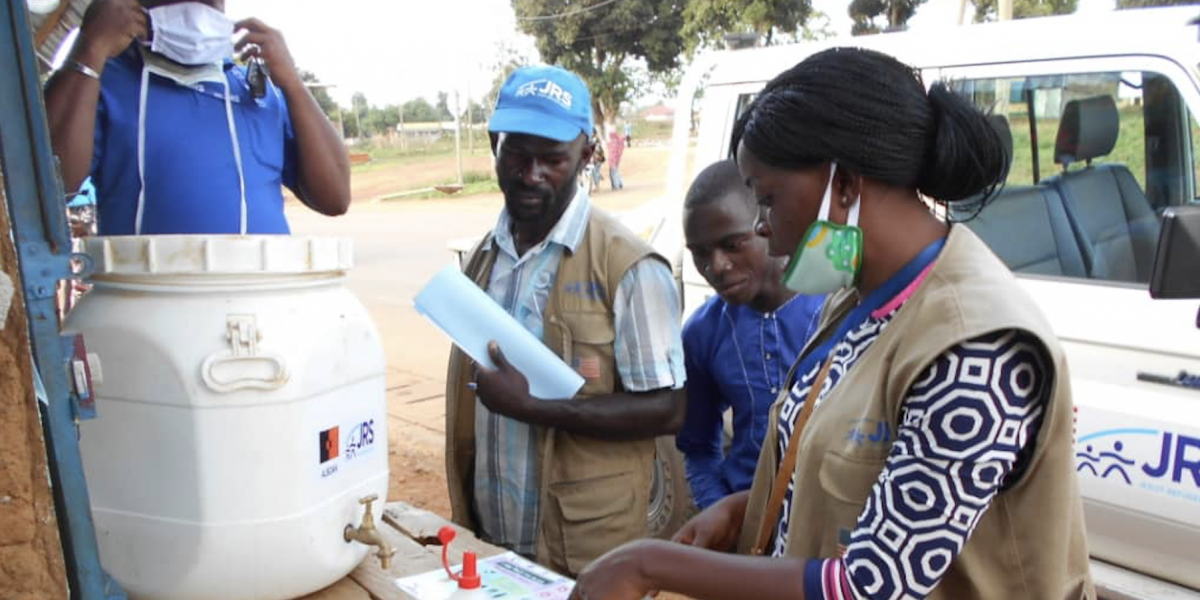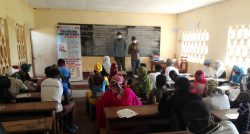Cameroon and CAR: Adapting accompaniment to COVID-19 times
02 July 2020

“COVID-19 is a medical and sanitary situation but there were risks before, and those risks are still here,” stated Claire Lefort, the National Program Officer in Cameroon and Central African Republic (CAR) at the Jesuit Refugee Service West Africa (JRS). “The pandemic just increases them, as there is a general situation of stress and extra vulnerability,” she added.
Most of JRS’s operations, which are supported in Cameroon by the US Department of State’s Bureau of Population, Refugees, and Migration (BPRM) and in CAR by Education Cannot Wait (ECW), were significantly pulled back at the start of the COVID-19 outbreak, but JRS has adapted our response amidst unsteady and diverse contexts in both countries.
“We have to implement COVID-19 prevention measures to protect our staff and the communities we work with but, at the same time, there are things we can’t do because the context is different,” Claire explained. Food insecurity, overcrowded spaces in IDP sites and refugee camps, armed conflicts, or the need to go to the field everyday make confinement almost impossible. “You cant say to the community that everybody is going to stay at home for one or two months waiting for the pandemic to be over,” Claire said, “We work in areas where there are still fights between rebel groups, the priority for the people is to survive.”
With all learning facilities currently closed due to COVID-19, new strategies to keep an educational routine were needed. JRS currently develops radio programs to maintain education activities, ensure child protection and offer psychosocial accompaniment since lockdown measures may increase the risk of SGBV, along with child recruitment and labor. We also participate in WhatsApp groups created by vocational training facilities that we support to help the students continue learning and interacting with their peers.
Specific COVID-19 prevention activities have been launched too. These measures include donations for hospitals in remote areas, hygiene item distribution, and information and awareness campaigns through radio WhatsApp, home visits, and caravan tours in Eastern Cameroon in partnership with a local organization.“ We were quite surprised by the large amount of fake-news that was spread about the virus, but there has been important information related work done by humanitarian partners, local NGOs, community leaders, and the government,” Claire said.

To overcome the current mobility restrictions, JRS expresses gratitude for local leaders and daily phone calls with JRS staff living in the communities. These measures allow us to monitor and intervene in the areas we work if needed.
The communities responded to the virus in various ways such as some students who made face masks for their neighbors at JRS sewing centers in Bambari (CAR) and Bertoua and Garoua (Cameroon). Additionally, a group of local and refugee women and beneficiaries of income revenue activities implemented by JRS, organized soap-making and hygiene workshops in Gbiti, East Cameroon in April.
In the future, one of the main challenges will be the start of the academic year. “During months, the children and youth were out of school and, even if we are developing a radio program, it is absolutely not the same as being at school, where they are with friends and the teachers,” Claire said. With the closure of school facilities, some children end up helping at their family’s small business or working in the field sometimes in remote areas. “We will have first to find those children, tell them that is important to go back to school and explain to the population that they can bring their children back and that we will do everything possible to keep them safe,” she explained.



